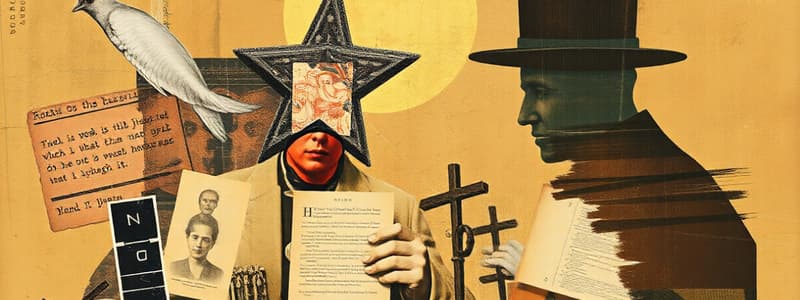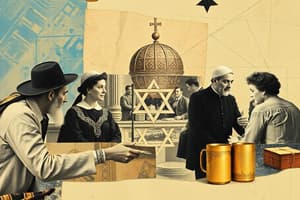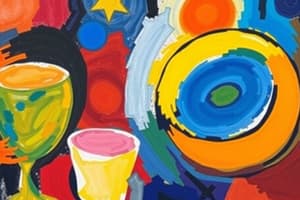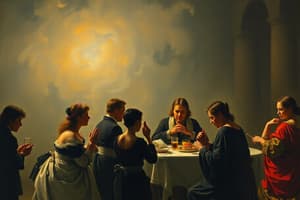Podcast
Questions and Answers
What is Hatarat Nedarim?
What is Hatarat Nedarim?
- Seeking forgiveness from others
- Canceling all promises and vows (correct)
- Making new promises
- Publicly declaring intentions
Why do people perform Hatarat Nedarim before Rosh Ha'Shana?
Why do people perform Hatarat Nedarim before Rosh Ha'Shana?
- To celebrate new beginnings
- To reaffirm their commitments
- To conduct public prayers
- To avoid breaking promises (correct)
What does Beinoni refer to in the context of Rosh Hashana?
What does Beinoni refer to in the context of Rosh Hashana?
- Someone whose scale is exactly even (correct)
- A person with many sins
- Someone of high status
- A person who is very righteous
What is the consequence for a Beinoni on Rosh Hashana?
What is the consequence for a Beinoni on Rosh Hashana?
What is the final meal on Erev YK called?
What is the final meal on Erev YK called?
Which tefilla is recited three times during Yom Kippur, each time a little louder?
Which tefilla is recited three times during Yom Kippur, each time a little louder?
Which of the following items is prohibited on Yom Kippur?
Which of the following items is prohibited on Yom Kippur?
Why do we wear white on Yom Kippur?
Why do we wear white on Yom Kippur?
What happens to someone who is judged as a Beinoni on Rosh Hashana?
What happens to someone who is judged as a Beinoni on Rosh Hashana?
Which of the following is involved in the custom of Kapparot?
Which of the following is involved in the custom of Kapparot?
What is one reason that people must seek forgiveness from others on Erev YK?
What is one reason that people must seek forgiveness from others on Erev YK?
During Vidui, what physical action is typically performed?
During Vidui, what physical action is typically performed?
What is the significance of the phrase Baruch Shem Kvod Malchuto LiOlam VaEd during Yom Kippur?
What is the significance of the phrase Baruch Shem Kvod Malchuto LiOlam VaEd during Yom Kippur?
What does the term Neila refer to?
What does the term Neila refer to?
What are the three categories of people mentioned in relation to Rosh Hashana?
What are the three categories of people mentioned in relation to Rosh Hashana?
What is the symbolic representation of eating apples or challah in honey during Rosh Hashana?
What is the symbolic representation of eating apples or challah in honey during Rosh Hashana?
What is the primary purpose of saying selichot on Erev Rosh Hashana?
What is the primary purpose of saying selichot on Erev Rosh Hashana?
Why is Rosh Hashana viewed as a day of judgement?
Why is Rosh Hashana viewed as a day of judgement?
Flashcards are hidden until you start studying
Study Notes
Rosh Ha'Shana
- Hatarat Nedarim is the canceling of all promises and vows
- People do Hatarat Nedarim before Rosh Ha'Shana to avoid breaking serious promises
- A common custom on Erev Rosh Ha'Shana is to arise early and say selichot
- Rosh Ha'Shana is chosen as the day of judgement because Adam Ha'Rishon sinned and was judged on the same day
- The 3 books that Hashem judges in are Tzaddikim, Beinonim, Reshaim
- A Beinoni is someone whose scale is exactly even
- If someone is considered a Beinoni on Rosh Ha'Shana, his judgement is postponed till Aseret Yimei Teshuva and signed on Yom Kippur
- The term "Simana Milta" means "Symbols are real"
- We eat apples or challah in honey on Rosh Ha'Shana because it's symbolic of a sweet new year
Yom Kippur
- Kapparot is a custom when we take chicken or money over our heads
- The mitzvah on Erev YK is to eat
- It's important to ask forgiveness from people on Erev YK because Hashem only forgives sins between individuals if those people forgave us
- When saying Vidui we pound our chest
- The final meal on Erev YK is called Seudat HaMafseket
- Four things we cannot do on YK are: eating, drinking, washing, anointing oils or creams, and wearing leather shoes
- We wear white on YK because it symbolizes purity and cleanliness
- Kol Nidrei is a tefilla that is said three times, each time a little louder
- The extra Shmone Esrei we add on YK is called Neila
- The praise we say out loud that we never say out loud the rest of the year is Baruch Shem Kvod Malchuto LiOlam VaEd
- The word Neila means "Closing"
- We read the book of Yona on YK, because it teaches us that Hashem accepts Teshuva
Rosh Hashanah
- Hatarat Nedarim is the canceling of all vows and promises
- People perform Hatarat Nedarim before Rosh Hashanah to ensure promises are kept
- Selichot are recited before Rosh Hashanah
- Rosh Hashanah is the day of judgement because Adam Ha'Rishon was judged on the same day
- The 3 books are Tzaddikim, Beinonim, Reshaim
- A Beinoni is someone who is neither righteous nor wicked
- A Beinoni's judgement is postponed until Aseret Yimei Teshuva and sealed on Yom Kippur
- Simana Milta means symbols are real
- Apples or challah in honey represents a desire for a sweet year
Yom Kippur
- On Erev Yom Kippur, people perform the custom of Kapparot by taking a chicken or money over their heads
- The mitzvah on Erev Yom Kippur is to eat
- It is important to ask forgiveness from people on Erev Yom Kippur because Hashem only forgives sins between people if those people forgive us
- People pound their chest when saying Vidui
- The final meal on Erev Yom Kippur is called Seudat HaMafseket
- On Yom Kippur, people cannot eat, drink, wash, anoint, or wear leather shoes
- White clothing symbolizes purity and cleanliness
- Kol Nidrei is a prayer recited three times, each time a little louder
- The extra Shmone Esrei recited on Yom Kippur is called Neila
- Baruch Shem Kvod Malchuto LiOlam VaEd is recited out loud on Yom Kippur
- Neila means closing
- The book of Yona is read on Yom Kippur because it demonstrates that Hashem accepts repentance
Studying That Suits You
Use AI to generate personalized quizzes and flashcards to suit your learning preferences.




